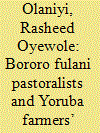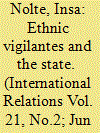| Srl | Item |
| 1 |
ID:
138124


|
|
|
|
|
| Summary/Abstract |
This article, based on in-depth oral interviews, focuses on the conflicts between Bororo Fulani pastoralists and Yoruba farmers in Saki and Iseyin towns of the Upper Ogun River (Oke-Ogun), Oyo State Nigeria to show the power disparity and competition over land resources. The conflicts that occurred between Bororo Fulani pastoralists and Yoruba farmers are classified as: economic (crop destruction and cattle killing); social (murder, rape, armed banditry, molestation on both sides of the conflict); and communal (large-scale destruction of villages, pastoral settlements and markets). Other conflicts involved access to grazing and water resources and access to markets. These conflicts were products of resource scarcity and broader challenges of power relations between indigenes and settlers/migrants in Nigeria. Ethnicity became more conspicuous among local people as these conflicts intensified. This article discusses the intervention of Yoruba traditional rulers (Oba) and Fulani headman (Ardo) in the formation of peace committees in Iseyin and Saki towns.
|
|
|
|
|
|
|
|
|
|
|
|
|
|
|
|
| 2 |
ID:
077391


|
|
|
|
|
| Publication |
2007.
|
| Summary/Abstract |
Based on the example of the Oodua People's Congress (OPC) in Nigeria, this article argues that vigilante activities are embedded in a range of social relations and historical trajectories. While vigilantism transforms relationships of power within the state, it does not necessarily undermine all aspects of state authority. After the annulled presidential election of a Yoruba speaker in 1993, the OPC was founded with the explicit political aim of safeguarding Yoruba ethno-nationalist interests vis-à-vis the state. By fighting crime, and state institutions perceived to be implicated in the perpetration of crime, including the police and military, the OPC's vigilantes have undermined and challenged the state's security institutions. Representing the state as both weak and strong, the OPC has undermined the state's control of security but legitimised and strengthened the state as a mechanism of political decision-making and social reform.
|
|
|
|
|
|
|
|
|
|
|
|
|
|
|
|
| 3 |
ID:
181244


|
|
|
|
|
| Summary/Abstract |
Urban renewal is central to ‘world-class’ city aspirations on the African continent: demolitions and evictions exemplify the power of the state to restructure urban space, prioritizing elite forms of accumulation and enforcing aesthetic norms of cleanliness, order and modernity. The ubiquity of world-class city-making has been taken by urban studies scholars as evidence of African leaders’ converging on a unitary aspirational urban imaginary. This article contends that the concept of world class should instead be understood as a key terrain on which African governments’ distinctive and diverse ideational ambitions are expressed. In Oyo State, southwest Nigeria, vernacular political traditions—in this case Yoruba cultural nationalism centred on the ideas of Obafemi Awolowo—were deployed by the state governor to legitimize urban renewal. Drawing on the Yoruba notion that elitism can be ‘generalized’, the cultivation of globalized urban forms was not only a project of becoming ever more homogenously ‘international’ but a historically grounded aspiration to become ever more essentially Yoruba. Thus, beyond commonalities across the discourses used to legitimize neoliberal urban development—world class, international and global—these universal sounding imaginaries may at the same time express much more particularistic political projects.
|
|
|
|
|
|
|
|
|
|
|
|
|
|
|
|